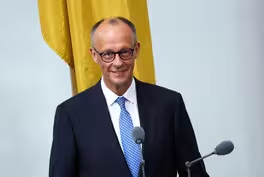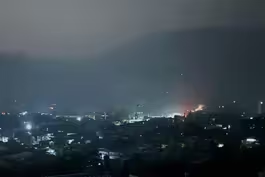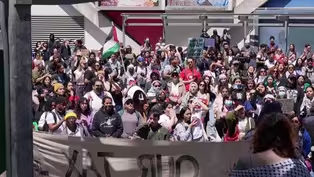
Carney shuts down Trump's threats to annex Canada
Clip: 5/6/2025 | 8m 5sVideo has Closed Captions
Carney shuts down Trump's threats to annex Canada, says tensions will take time to resolve
The new Canadian prime minister came to the White House to meet President Trump amid an acrimonious war of words. Mark Carney was elected last week amid Trump's repeated insistence that the U.S. should annex Canada, leading to an unprecedented outpouring of anger there. Laura Barrón-López reports and Amna Nawaz discusses how Canada is viewing the meeting with Brian Clow.
Problems playing video? | Closed Captioning Feedback
Problems playing video? | Closed Captioning Feedback
Major corporate funding for the PBS News Hour is provided by BDO, BNSF, Consumer Cellular, American Cruise Lines, and Raymond James. Funding for the PBS NewsHour Weekend is provided by...

Carney shuts down Trump's threats to annex Canada
Clip: 5/6/2025 | 8m 5sVideo has Closed Captions
The new Canadian prime minister came to the White House to meet President Trump amid an acrimonious war of words. Mark Carney was elected last week amid Trump's repeated insistence that the U.S. should annex Canada, leading to an unprecedented outpouring of anger there. Laura Barrón-López reports and Amna Nawaz discusses how Canada is viewing the meeting with Brian Clow.
Problems playing video? | Closed Captioning Feedback
How to Watch PBS News Hour
PBS News Hour is available to stream on pbs.org and the free PBS App, available on iPhone, Apple TV, Android TV, Android smartphones, Amazon Fire TV, Amazon Fire Tablet, Roku, Samsung Smart TV, and Vizio.
Providing Support for PBS.org
Learn Moreabout PBS online sponsorshipAMNA NAWAZ: Here in the U.S. today, the new Canadian prime minister came to the White House to meet President Trump amid an acrimonious war of words started by Mr. Trump that's roiled the historic alliance between the neighbors.
GEOFF BENNETT: Mark Carney was elected just last week after his predecessor, Justin Trudeau, stepped down in March.
Mr. Trump's repeated insistence that the U.S. should annex Canada and the tariffs levied on many goods are leading to an unprecedented outpouring of anger in Canada.
Our Laura Barron-Lopez has more.
LAURA BARRON-LOPEZ: Today, a meeting between two neighbors, their historic alliance in tatters.
MARK CARNEY, Canadian Prime Minister: Thank you for your hospitality.
LAURA BARRON-LOPEZ: President Trump sitting down with Canada's new prime minister, Mark Carney, who campaigned on a promise to confront Trump.
DONALD TRUMP, President of the United States: His party was losing by a lot.
And he ended up winning, so I really want to congratulate him.
LAURA BARRON-LOPEZ: The high-stakes talks began with pleasantries.
Within minutes, Carney shut down Trump's repeated declaration that he wants to annex Canada and make it the 51st state.
MARK CARNEY: As you know from real estate, there are some places that are never for sale.
DONALD TRUMP: That's true.
MARK CARNEY: We're sitting in one right now, Buckingham Palace that you visited as well.
DONALD TRUMP: That's true.
MARK CARNEY: And having met with the owners of Canada over the course of the campaign last several months, it's not for sale.
It won't be for sale ever.
LAURA BARRON-LOPEZ: But Trump again brushed it aside.
DONALD TRUMP: Time will tell.
It's only time.
But I say never say never.
LAURA BARRON-LOPEZ: The war of words began long before today's visit.
Carney, fresh off his election win last week, was clear that the U.S.-Canada relationship is completely changed.
MARK CARNEY: Our old relationship, based on steadily increasing integration, is over.
The questions now are how our nations will cooperate in the future and where we in Canada will move on.
LAURA BARRON-LOPEZ: At today's meeting, differences on trade were front and center, even if they were muddled by more false statements from President Trump.
DONALD TRUMP: Well, we don't do much business with Canada from our standpoint.
They do a lot of business with us.
We're at like 4 percent and usually those things don't last very long.
LAURA BARRON-LOPEZ: The U.S. and Canada have been among each other's top trading partners for decades.
And when asked about tariffs, Trump was blunt.
QUESTION: Is there anything he could say to you in the course of your meetings with him today that would get you to lift tariffs on Canada?
DONALD TRUMP: No.
QUESTION: Why not?
DONALD TRUMP: Just the way it is.
LAURA BARRON-LOPEZ: Carney, who is a two-time central bank chief himself, went on to agree.
Economic differences will take time to resolve.
MARK CARNEY: This is a bigger discussion.
There are much bigger forces involved.
And this will take some time and some discussions.
And that's why we're here.
LAURA BARRON-LOPEZ: Later in the afternoon, Carney made his way to the Canadian Embassy... MARK CARNEY: Good afternoon.
LAURA BARRON-LOPEZ: ... just down Pennsylvania Avenue from the White House, and told reporters he asked Trump to stop calling Canada the 51st state.
MARK CARNEY: We have more -- a lot more work to do.
I'm not trying to suggest at any respect that we can have one meeting and everything's changed.
But now we are engaged.
LAURA BARRON-LOPEZ: Despite the uncertainty, Carney remained optimistic... MARK CARNEY: Thank you very much.
LAURA BARRON-LOPEZ: ... about the future of the relationship.
For the "PBS News Hour," I'm Laura Barron-Lopez.
AMNA NAWAZ: To get more perspective on how Canada is viewing the first meeting between Prime Minister Carney and President Trump, I'm joined by Brian Clow.
He was the deputy chief of staff to former Prime Minister Justin Trudeau and has also served as the executive director for Canadian-U.S. relations at the former prime minister's office.
Brian Clow, welcome to the "News Hour."
Thanks for joining us.
BRIAN CLOW, Former Deputy Chief of Staff to former Prime Minister Justin Trudeau: Great to be here.
AMNA NAWAZ: So these are two men who, it's fair to say, have sparred from afar.
But they kept a very civil tone in this first face-to-face meeting.
So how do you look at it?
Did they do any repair to a damaged relationship or just emerge without additional damage done?
BRIAN CLOW: I think the Canadian goal going into this meeting was to refresh, restart the relationship after a very tumultuous few months since Donald Trump returned to office.
And Prime Minister Carney clearly achieved what he needed to achieve.
He didn't need to come out of today with a tariff lift or any specific policy outcome.
What he needed to do was establish a constructive tone with the president that can lead into further talks.
What struck me was how positive and respectful the president was in return.
And what I mean by that is not in substance, but in tone.
And that is an important difference.
He was -- the president clearly respects Mark Carney.
And I think that will lay the foundation for future talks.
That said, it's still concerning to see the president repeating some egregious statements about annexation of Canada and trying to shut down some of our core industries like auto.
AMNA NAWAZ: So, does this in some way sort of open the door for the two sides to negotiate with a bit more substance?
And if that's the case, what would be the top of Carney's list in terms of what he'd like to see get done?
BRIAN CLOW: Right.
It's -- well, I know the Canadian side and I'm sure the American side too were using today to scope out what could be the foundation for further talks and where there might be some room for cooperation.
I believe the Canadians would have come in with the outlines of some potential areas of further cooperation, things like defense spending, energy, critical minerals.
But there can only be further cooperation if the tariffs are ultimately lifted.
And as long as the tariffs are in place, I think we're going to continue to see the relationship be quite strained.
AMNA NAWAZ: Well, those tariffs have to be already taking some kind of a hit to the Canadian economy.
And we have heard Carney say that he would walk away from a bad deal if Mr. Trump refuses to budge.
Can Canada afford to do that?
BRIAN CLOW: So it's definitely having an impact on our economy, just like it's having an impact on the U.S. economy.
There has been some slowdown already in the Canadian auto sector.
And it has caused -- the tariffs have caused a general chill, a freeze on investment and growth in the country.
That said -- and I don't want to understate the challenges that we have already faced -- I think Canada has time here to weather this storm.
And, therefore, Prime Minister Carney and his team have some time and some room to negotiate, and they won't be forced into a bad deal.
The prime minister has said that clearly.
I expect -- while I'm hopeful these talks could unfold and be wrapped up in a matter of weeks, I would expect that negotiations will go on much longer than that.
AMNA NAWAZ: In terms of the support Carney has back home, I mean, there's been some reporting here about the anger among Canadians.
Mr. Trump's remarks and the tariffs have sparked sort of a surge in nationalism, boycotting American products and so on.
How would you describe what you have seen there on the ground?
BRIAN CLOW: Yes, it's like nothing I have ever seen.
And I don't think there are many Canadians alive who would have seen the level of patriotism that we're currently experiencing right now.
It's unfortunate that it took these threats that we're seeing from the U.S. president to bring us all together in the way we are.
But if there's one upside to these threats, it is our renewed sense of patriotism.
Canadians are really angry.
They're really upset at what the president and his team have said about us.
And that is -- it has dug the relationship into a very big hole and it's going to take some time to dig out of that hole.
AMNA NAWAZ: That is Brian Clow, deputy chief of staff to former Prime Minister Justin Trudeau, joining us from Toronto tonight.
Brian, thank you for your time.
Good to speak with you.
BRIAN CLOW: Thank you very much.
The challenges Germany's new conservative chancellor faces
Video has Closed Captions
Clip: 5/6/2025 | 5m 18s | As Germany selects a new conservative chancellor, a look at the challenges he inherits (5m 18s)
India launches missile strikes into Pakistani territory
Video has Closed Captions
Clip: 5/6/2025 | 2m 21s | India strikes Pakistani territory in response to militant attack on tourists (2m 21s)
Rep. Malliotakis on breaking with GOP on Medicaid cuts
Video has Closed Captions
Clip: 5/6/2025 | 6m 4s | GOP Rep. Malliotakis on breaking with her party and taking a stand against Medicaid cuts (6m 4s)
Trump's college crackdown raises concerns about free speech
Video has Closed Captions
Clip: 5/6/2025 | 9m 39s | How Trump's college crackdown is raising concerns about free speech and academic freedom (9m 39s)
Understanding the conclave and the selection of a new pope
Video has Closed Captions
Clip: 5/6/2025 | 7m 24s | Understanding the conclave, the secretive process to choose a new pope (7m 24s)
What's behind the major delays at Newark's airport
Video has Closed Captions
Clip: 5/6/2025 | 5m 52s | What's behind the major delays and cancellations at Newark's airport (5m 52s)
Providing Support for PBS.org
Learn Moreabout PBS online sponsorship
- News and Public Affairs

FRONTLINE is investigative journalism that questions, explains and changes our world.

- News and Public Affairs

Amanpour and Company features conversations with leaders and decision makers.












Support for PBS provided by:
Major corporate funding for the PBS News Hour is provided by BDO, BNSF, Consumer Cellular, American Cruise Lines, and Raymond James. Funding for the PBS NewsHour Weekend is provided by...






